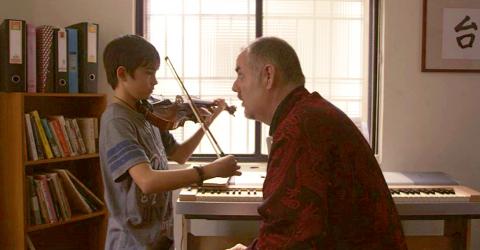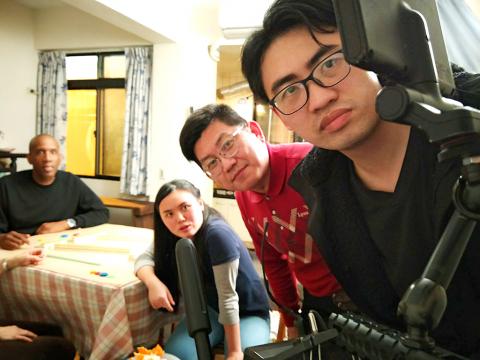Rick Monday promises that his short film about the expat experience won’t be about five white guys drinking beer in Taiwan. Nor will it be a “gripe film” about how bad the traffic is.
In fact, most of Uncle Buddy is in Mandarin, depicting what happens to a pretty typical Taiwanese family when wayward Aunt Betty’s new black boyfriend visits the house.
“My story is about the definition of a Taiwanese family as an outsider looking in,” says the aspiring screenwriter and Taiwan resident of 31 years. “For those who have married into a family here, no father wants their daughter to marry a foreigner. But after a while they get used to it … We also adapt … and become less American and more Taiwanese.”

Photo courtesy of Urban Nomad
The nine-minute Uncle Buddy is one of four productions developed through Filmmaker Nights Taipei’s short film development project, spearheaded by local filmmaker Tobie Openshaw as a way to realize the works of expat screenwriters who he says are often ignored because they’re neither foreign or Taiwanese enough. With each film shot in just two days on a low budget with various professionals donating their equipment and expertise, the films will be shown during the Urban Nomad Film Festival on May 27 with a post-screening discussion.
“I particularly asked for screenplays that speak something to the expat experience in Taipei,” Openshaw says. “Sometimes expat screenwriters write stories that are set in LA, and I say ‘No, you’re living in a unique environment and you’re in a unique position. Write about that.’”
THROUGH EXPAT EYES

Photo courtesy of Filmmaker Nights Taipei
Urban Nomad co-founder and curator David Frazier says the project brings him back to the early days of the festival where people were excited to make films just for the event.
“For the first five or six years … there was a core of maybe a dozen people who would try to make a film every year to show in the festival,” he says. “But people moved, they got jobs… It’s one of those things with amateur filmmakers, you can’t necessarily keep the fire going year after year.”
The four shorts were selected out of 12 submissions, with an experienced director assigned to each screenplay. Most of the funds came out of the director and screenwriters’ pocket, with various filmmakers pitching in their expertise, talent and gear — Michael Geier, who runs a production and design studio in Taipei, even let them use his high-end RED digital cinema camera for free and volunteered as director of photography.

Photo courtesy of Filmmaker Nights Taipei
The subjects are diverse but all set in Taiwan — in addition to Monday’s cross-cultural family drama, the remaining films explore the dark corners of the Internet, an interracial lesbian love story and a garbage truck concerto.
Openshaw says that part of the aim is to give more exposure to expat filmmakers, as there are few funding opportunities for them in Taiwan. Monday says he sought financial assistance from the Taipei Film Commission, but was told they were mostly looking for foreign big guns such as Martin Scorsese to make films in Taiwan, or feature films that involve Taiwan to increase the country’s global exposure.
“We want to say, ‘Hey, look, with almost no budget this is what we can produce, and this is how we see Taiwan,” Openshaw says. “It helps people get an idea of the expat community that’s living among them everyday in Taipei … what they find interesting, funny, quirky and everything.”

Photo courtesy of Filmmaker Nights Taipei
NOT NETFLIX
This year’s Urban Nomad is premiere heavy, with 37 films showing for the first time in Taiwan. Frazier says many of the filmmakers will be on site for discussions, including Jennifer Shagawat, producer for the opening film Here to Be Heard and riot grrrl musician who will do a question and answer session with Taiwan’s own riot grrl, Gao Xiao-gao (高小糕).
“We don’t want to be Netflix, where you just pick the one that’s interesting,” Frazier says. “How do we add another dimension and make it more of a personal experience?”
In addition to the usual themes of music, art, social movements and technology, this year also has a Grrl Power category, established after Frazier noticed that between one-third and half of the selections were either about women or by female directors.
Frazier says the film that is getting the most attention, judging from online activity, is Metal Politics Taiwan, a German production about Taiwanese metal singer-turned-politician Freddy Lim (林昶佐).
“It’s an interesting one, being by a German filmmaker whose primary audience is overseas but about Taiwanese politics,” he says.

In the March 9 edition of the Taipei Times a piece by Ninon Godefroy ran with the headine “The quiet, gentle rhythm of Taiwan.” It started with the line “Taiwan is a small, humble place. There is no Eiffel Tower, no pyramids — no singular attraction that draws the world’s attention.” I laughed out loud at that. This was out of no disrespect for the author or the piece, which made some interesting analogies and good points about how both Din Tai Fung’s and Taiwan Semiconductor Manufacturing Co’s (TSMC, 台積電) meticulous attention to detail and quality are not quite up to

April 21 to April 27 Hsieh Er’s (謝娥) political fortunes were rising fast after she got out of jail and joined the Chinese Nationalist Party (KMT) in December 1945. Not only did she hold key positions in various committees, she was elected the only woman on the Taipei City Council and headed to Nanjing in 1946 as the sole Taiwanese female representative to the National Constituent Assembly. With the support of first lady Soong May-ling (宋美齡), she started the Taipei Women’s Association and Taiwan Provincial Women’s Association, where she

Chinese Nationalist Party (KMT) Chairman Eric Chu (朱立倫) hatched a bold plan to charge forward and seize the initiative when he held a protest in front of the Taipei City Prosecutors’ Office. Though risky, because illegal, its success would help tackle at least six problems facing both himself and the KMT. What he did not see coming was Taipei Mayor Chiang Wan-an (將萬安) tripping him up out of the gate. In spite of Chu being the most consequential and successful KMT chairman since the early 2010s — arguably saving the party from financial ruin and restoring its electoral viability —

It is one of the more remarkable facts of Taiwan history that it was never occupied or claimed by any of the numerous kingdoms of southern China — Han or otherwise — that lay just across the water from it. None of their brilliant ministers ever discovered that Taiwan was a “core interest” of the state whose annexation was “inevitable.” As Paul Kua notes in an excellent monograph laying out how the Portuguese gave Taiwan the name “Formosa,” the first Europeans to express an interest in occupying Taiwan were the Spanish. Tonio Andrade in his seminal work, How Taiwan Became Chinese,